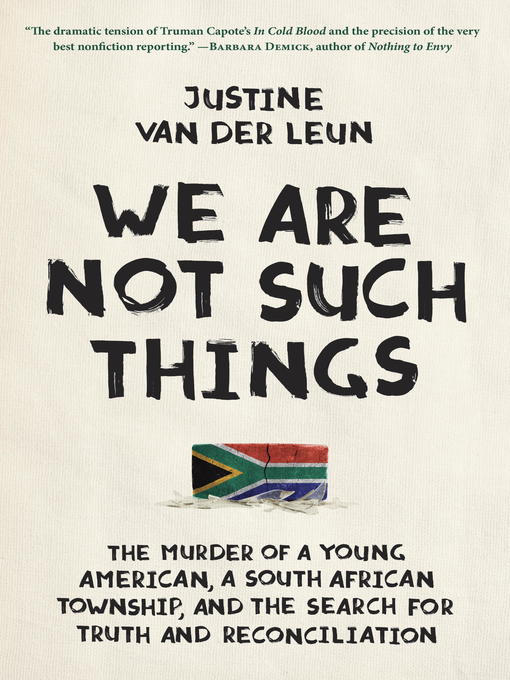
We Are Not Such Things
The Murder of a Young American, a South African Township, and the Search for Truth and Reconciliation
کتاب های مرتبط
- اطلاعات
- نقد و بررسی
- دیدگاه کاربران
نقد و بررسی

May 16, 2016
Van der Leun (Marcus of Umbria) focuses this tour-de-force depiction of modern South Africa on the 1993 death of Amy Biehl, a white American grad student and anti-apartheid activist living in Cape Town who was murdered by a mob as apartheid fell. The narrative follows Van der Leun as she uncovers a series of discrepancies surrounding Biehl’s murder and the subsequent truth and reconciliation commission for Biehl’s killers. Amid the suspense of her investigation, Van der Leun skillfully weaves in glimpses into contemporary South Africa, delving into issues such as the systemic disenfranchisements caused by apartheid, the colonial legacies of the British and the Dutch, rampant police brutality, government ineptitude, and the myriad issues that the country now faces in a fractured system. With a strong voice and exact vocabulary, Van Der Leun expertly juxtaposes the lives of white elites with the grim reality of the black township. Van Der Leun succeeds in telling a complex, nuanced, and perhaps ultimately unknowable story that will captivate all readers.

May 1, 2016
Unraveling a web of evidence in a notorious murder.After moving to South Africa for her husband's work, van der Leun (Marcus of Umbria: What an Italian Dog Taught an American Girl About Love, 2010) became fascinated by the story of Amy Biehl, an American Fulbright scholar who was brutally murdered--stoned and stabbed--in Cape Town in 1993. Four years later, with apartheid ended, the nation's Truth and Reconciliation program was put in place. This "experiment in restorative justice" offered "release and a clean slate to those, who, upon taking responsibility, fully, and honestly, for their apartheid-era crimes, could prove that their misdeeds were politically motivated." Among those who came forward were two men convicted for Amy's murder, and prominent among those who forgave were Amy's parents. The Biehls set up a foundation in Amy's name to further the study of democracy and gender rights, and they gave jobs to the two men whom they embraced. The author's initial interest was the Biehls, whose gesture made them celebrities in South Africa and the U.S. She wanted to understand how they could forgive--and forge a close relationship with--the murderers. But soon her focus shifted to the crime itself, which seemed to be far more complicated than what she gleaned from official documents. She repeatedly interviewed Easy, the most voluble of the convicted men, retracing the events leading to Amy's death, Easy's youth, and the volatile politics of the time. "I felt like a kid who wants to hear the same bedtime story again and again: for comfort, or to better understand, or maybe hoping that this time some detail would shift to reveal a new, improved tale," she writes. Unfortunately, reiterating the story over and over results in a tedious narrative and revelations less surprising than she implies. The author's vivid details of South Africa's persistent racism, abject poverty, and continuing oppression are undermined by unnecessary repetition.
COPYRIGHT(2016) Kirkus Reviews, ALL RIGHTS RESERVED.

May 15, 2016
Befitting its heft, this work by van der Leun (Marcus of Umbria) tells layers of stories. Most significant, it recounts the author's four-year investigation of the 1993 murder of white American activist and student Amy Biehl, set upon by young, black South Africans while driving friends to the township of Gugulethu, mere months before the official end of apartheid. Van der Leun, an American writer living in Cape Town, became captivated by the events surrounding Amy's death, including the Biehls' establishment of a foundation in Amy's memory, their extraordinary mercy and warmth toward two of the men accused of the killing, and the trajectories of the individuals involved. The author's quest to learn the facts of the case leads in many directions, stretching tenuously through bureaucracies of prisons and court records and confronting the often difficult history of South Africa. Built from personal observations against a messy geopolitical backdrop, this stunning portrait of a country is remarkable for the author's immersion in communities where she is utterly foreign in race, education, and economic means yet (mostly) accepted and embraced by those whose accounts she seeks. VERDICT This frequently gripping, occasionally meandering true-crime narrative provides an intimate, intricate depiction of embedded journalism. Lengthy but powerful.--Janet Ingraham Dwyer, State Lib. of Ohio, Columbus
Copyright 2016 Library Journal, LLC Used with permission.

























دیدگاه کاربران